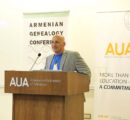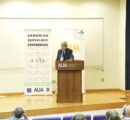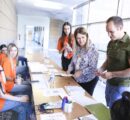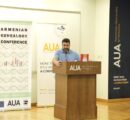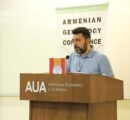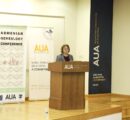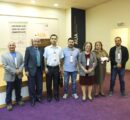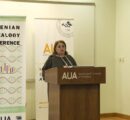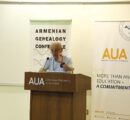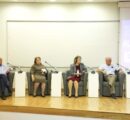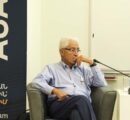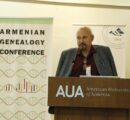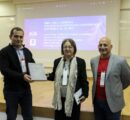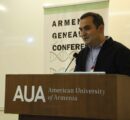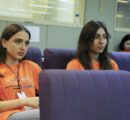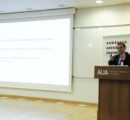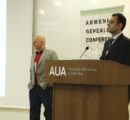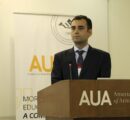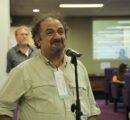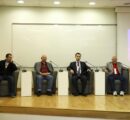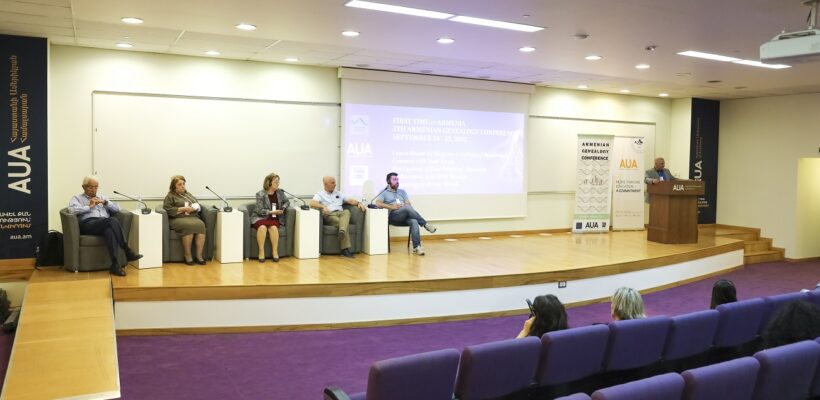
AUA Hosts 5th Armenian Genealogy Conference
4 min readYEREVAN, Armenia — The Armenian Genealogy Conference (AGC) held its 5th annual meeting in Yerevan on September 24-25 at the American University of Armenia (AUA). The weekend began with a book presentation by AUA President Emeritus and founding dean of the Turpanjian College of Health Sciences Dr. Haroutune Armenian. The book, Epidemics and Mortality in the Parish Records of Diasporan Armenian Churches (1732-1982), reveals a number of breakthrough findings from his epidemiological analysis of data taken from church parish records of the Armenian populations in 11 countries and extending over a period of 250 years.
On Saturday, after welcoming remarks by AGC Founder George Aghjayan and AUA Dean of General Education Sharistan Melkonian, the conference opened with Dr. Armenian’s introduction of the story behind retrieving Armenian church records from the Church of Latter Day Saints (LDS) Family History Library and the significance of their usage in epidemiological studies. Dr. Armenian’s presentation detailed mortality trends, episodes of epidemics, and the continuing impact of the Genocide on survivors living in refugee camps.
Presenting next was Dr. Rafael Abrahamyan, chairman of the Armenian Historical and Genealogical Society, who spoke on the genealogy of Artsakh. Dr. Abrahamyan explained the available sources and the methodology employed for the examination of the data. He went on to show and discuss images of family trees and Armenian church records obtained from sources throughout Artsakh. Artsakh is one of the locations where hereditary nobility was preserved until the 20th century. At the conclusion of his talk, Dr. Abrahamyan gifted to AUA’s AGBU Papazian library a copy of the inaugural issue of Armenian Genealogy, the first journal devoted to Armenian genealogy.
Dr. Levon Yepiskoposyan, head of the Laboratory of Ethnogenomics at the Institute of Molecular Biology of the National Academy of Sciences of the Republic of Armenia, spoke about the extensive work he is leading to create a genetic atlas of historical Armenia.
Dr. Sonya Mirzoyan, former director of the National Archives of Armenia, closed Saturday morning’s session with an overview of the genealogical resources available in the Armenian National Archives. She discussed the Armenian Church metric books and census material, as well as family genealogies available in the archives.
Dr. Anahit Grigoryan, director of the State Archives of Artsakh, was first to present on Saturday afternoon an in-depth look at the resources available for genealogical research. The destruction of Armenian cultural sites during and after the end of the 2020 war made Dr. Grigoryan’s presentation even more relevant. The preservation and maintenance of these records is critical to documenting the historical Armenian presence in Artsakh.
Saturday’s final presentation was by George Aghjayan, who spoke about genealogical resources of Armenians living in Turkey or of individuals whose ancestors came from various regions of Turkey. He enumerated Ottoman resources, Armenian church records, Armenian memory books, and family history reports available to citizens of Turkey through their government’s eDevlet system.
Sunday morning’s session opened with Dr. Panov Dmitri Arkadievich, chief of research and genealogical study at DST Kristian (the House of Family Tradition), presenting on the Armenian genealogical research available in Russian archives. He explained the vital importance of church records as well as business directories and land records covering a broad geographic region to which Armenians migrated for centuries.
Next were two presentations by Dr. Tigran Matosyan and Andranik Nahapetyan, which offered important narrative context. AUA Assistant Professor Matosyan discussed the pattern of giving names to children born in the city of Van. Throughout the 19th and 20th centuries, the Armenians of Van showed a proclivity for homonyms when naming their children, a practice that took many forms, some not so obvious.
Nahapetyan, independent researcher and member of the Council of Experts of the SFU ISRS Center for Armenian Studies (Southern Federal University, Institute of Sociology and Regional Studies), spoke of the genealogy and origins of the family of Simon Vratsian, the fourth prime minister of the First Republic of Armenia. He drew on autobiographical memoirs, fieldwork, population censuses, parish register, reference books, and interviews with contemporaries. Through the example of Vratsian’s family, Nahapetyan also expanded on resources available for Armenians from Nor Nakhichevan.
The conference ended with Aghjayan’s overview of DNA testing and the tools available from each of the companies that offer testing: ancestry.com, 23andMe, FamilyTreeDNA, and MyHeritage, as well as the third-party analytical website gedmatch.com. He expounded the importance of DNA testing in the context of Armenian history and how he had located and reconnected with family in Turkey separated during the Genocide. A number of DNA tests donated by AGC were administered to conference attendees.
A question-and-answer session followed each presentation. Participants also had a chance to ask questions at the end of each day. Presentations were made in Armenian, Russian, and English, with simultaneous interpretation provided by AUA. All presentations were recorded and will be made available online.
The weekend ended with a number of participants submitting to DNA testing.
Undergraduate students in Gregory Chahrozian’s Genetics course volunteered throughout the conference.
The conference was organized and cosponsored by AGC, AUA, and the Hamazkayin Armenian Educational and Cultural Society.
Founded in 1991, the American University of Armenia (AUA) is a private, independent university located in Yerevan, Armenia, affiliated with the University of California, and accredited by the WASC Senior College and University Commission in the United States. AUA provides local and international students with Western-style education through top-quality undergraduate, graduate, and certificate programs, promotes research and innovation, encourages civic engagement and community service, and fosters democratic values.
Media Coverage:
[The Armenian Weekly] AUA hosts 5th annual Armenian Genealogy Conference

